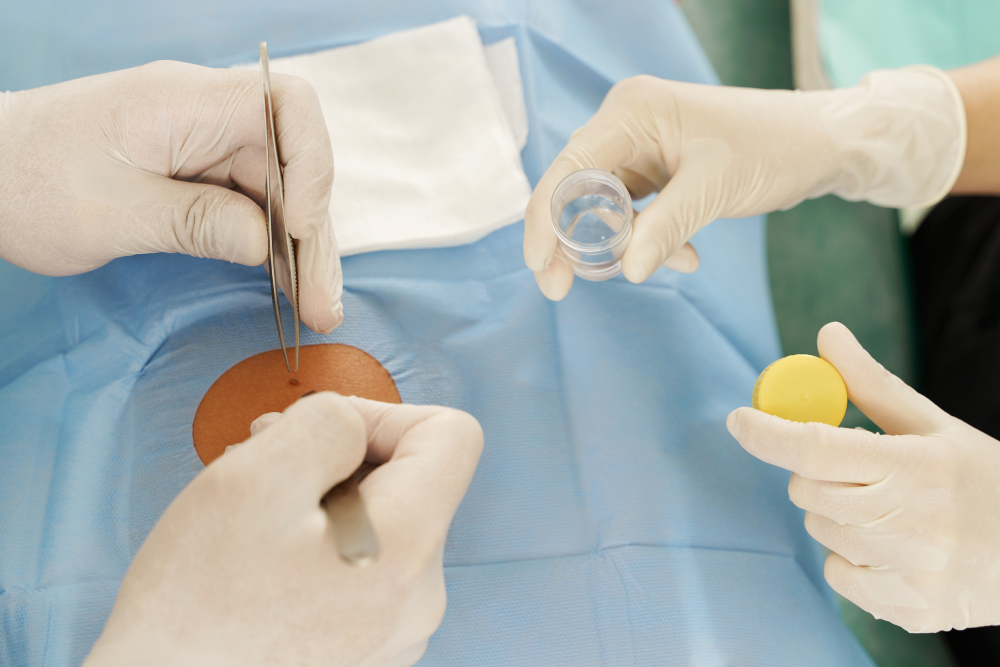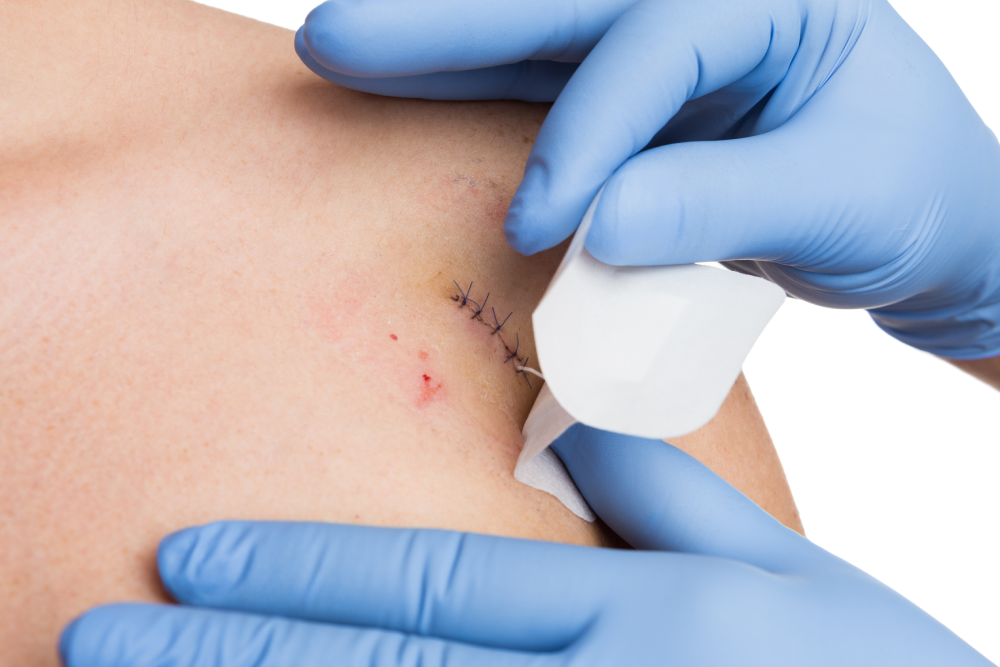Most people think of skin cancer treatment as the finish line. The moment the biopsy is clear, the excision is complete, and the threat is behind you, it’s easy to assume your skin will simply bounce back. But the truth is, that’s only the halfway point.
What happens after skin cancer treatment is just as critical, especially when it comes to long-term skin health and aesthetics. Whether you’ve had a small basal cell removed from your cheek or a more involved melanoma excision on your shoulder, your skin needs thoughtful aftercare.
This is where cosmetic dermatology after skin cancer takes center stage. Your skin is healing. It’s been surgically treated, possibly stitched, and may now carry signs of trauma. It’s also more vulnerable to future damage, which makes post-surgery skin care essential—not just for protection, but for preserving your skin’s natural beauty.
At Metropolis Dermatology, we care for patients before, during, and long after treatment. If you or someone you love is recovering from skin cancer treatment, this guide walks you through what happens next—how to care for your skin, prevent recurrence, and maintain your confidence.
Understanding Skin Cancer
Skin cancer is the uncontrolled growth of abnormal skin cells. It typically occurs when ultraviolet (UV) radiation from the sun or tanning beds causes mutations in the DNA of skin cells, leading them to multiply rapidly and form malignant tumors.
There are three primary types of skin cancer:
- Basal Cell Carcinoma (BCC): The most common and least aggressive. It grows slowly and rarely spreads, but can cause disfigurement if untreated.
- Squamous Cell Carcinoma (SCC): Often found on sun-exposed areas and can be more aggressive than BCC.
- Melanoma: The most dangerous form of skin cancer. Though less common, it can spread to other organs if not caught early.
The good news? When detected early and treated appropriately, skin cancer has one of the highest cure rates in modern medicine. But once treatment is complete, skin healing after cancer surgery becomes the next focus—and that requires informed, preventative care.
What Causes Skin Cancer?
Skin cancer may be linked to genetics in some cases, but environmental and lifestyle factors often play a larger role. Understanding what contributes to skin cancer can also shape how you care for your skin afterward.
Here are the leading contributors:
- UV Radiation: The most well-documented cause. Sunburns—especially those acquired in childhood—significantly increase risk.
- Tanning Beds: Artificial UV exposure has been directly linked to increased melanoma risk.
- Fair Skin or Light Eyes: Less melanin means less natural protection against UV radiation.
- History of Sun Exposure: Years spent outdoors without proper sun protection often contribute.
- Immunosuppression: Patients with weakened immune systems are at greater risk.
- Personal or Family History: Having had skin cancer once increases your chances of developing it again.
Metropolis Dermatology offers medical and cosmetic procedures that address skin cancer and promote both recovery and prevention. Once your initial treatment is complete, your skincare needs evolve—and your regimen should too.

What Are Skin Biopsy and Excision Procedures?
Two of the most common diagnostic and treatment tools for skin cancer are the skin biopsy and skin cancer excision. Both are outpatient procedures, but serve different purposes in your journey.
Skin Biopsy
A biopsy is often the first step in diagnosis. A dermatologist removes a small sample of suspicious skin tissue, which is sent to a lab to determine whether cancer cells are present. This is a quick procedure done under local anesthesia, usually with minimal discomfort.
Skin Cancer Excision
Once a positive diagnosis is confirmed, excision is often recommended. This involves surgically removing the cancerous tissue along with a small margin of surrounding skin to ensure all abnormal cells are eliminated.
Depending on the size, depth, and location of the cancer, your provider may use stitches or advanced wound closure techniques. While highly effective, both procedures can leave skin cancer scars—making post-care essential to help your skin recover not just medically, but cosmetically as well.
Aftercare Tips to Support Skin Healing and Beauty
Healing after skin cancer surgery isn’t just about closing the wound—it’s about reconditioning your skin to prevent recurrence, reduce scarring, and restore balance. Here’s how to support your skin at every stage post-treatment:
1. Keep the Area Clean and Moisturized
Immediately after surgery, proper wound care is critical. Use gentle cleansers and non-comedogenic, fragrance-free moisturizers to keep the area hydrated. This promotes healing and reduces the appearance of scars over time.
- Avoid alcohol-based or aggressive exfoliating products.
- Look for ointments or creams with ceramides or hyaluronic acid for added hydration.
2. Protect Against Sun Exposure—Religiously
Sun exposure is the most preventable risk factor in skin cancer recurrence. Use broad-spectrum sunscreen daily—even on cloudy days. Choose mineral-based sunscreens with zinc oxide or titanium dioxide for sensitive, healing skin.
- Reapply every 2 hours when outdoors.
- Wear wide-brimmed hats, UPF clothing, and avoid peak sunlight hours.
- Think of SPF as daily therapy, not just summer skincare.
3. Avoid Picking or Scratching the Site
Healing skin may feel itchy, but scratching can disrupt new collagen formation, lead to infection, and worsen skin cancer scars. Keep nails trimmed, apply calming ointments, and consider using silicone-based scar gels once the wound is closed.
4. Stay Hydrated and Support Collagen Internally
What you put inside your body impacts how your skin heals on the outside. Stay well-hydrated and consider collagen-boosting supplements, or incorporate vitamin C-rich foods, leafy greens, and omega-3s to promote natural healing.
- Zinc and protein are particularly helpful for post-surgical recovery.
- Avoid processed foods that can trigger inflammation.
5. Integrate Cosmetic Dermatology Thoughtfully
Once your dermatologist clears you, you may consider cosmetic dermatology after skin cancer to address texture, tone, and discoloration. Treatments might include:
- Laser resurfacing (in approved areas)
- Microneedling for scar softening
- Chemical peels to address pigmentation
- Topical retinoids for smoothing and cellular turnover
These treatments can gradually minimize scars and restore radiance. Always consult your dermatology provider before beginning.
6. Rebuild Your Skincare Routine Around Recovery
Many patients return to harsh anti-aging or exfoliating products too soon. After skin cancer treatment, your skin needs gentle, supportive products designed to nourish and protect. Key ingredients to look for:
- Niacinamide (anti-inflammatory and brightening)
- Peptides (support collagen regeneration)
- Aloe vera and green tea extract (calm inflammation)
- Panthenol (restores skin barrier)
Avoid: retinol, benzoyl peroxide, or hydroquinone until your provider says it’s safe.
7. Schedule Routine Skin Checks
Even after successful treatment, new lesions can develop. A commitment to ongoing dermatologic monitoring is your best defense. Annual skin checks—or more frequently, based on your history—can catch changes early, before they become dangerous.
Also, conduct monthly self-checks at home, paying close attention to:
- New moles or growths
- Changes in existing spots
- Any itchiness, bleeding, or color change
Your skin’s story continues after cancer. You just get to help write the next chapter with awareness, self-care, and expert support.

Healing Is More Than Survival
At Metropolis Dermatology in Los Angeles, Pasadena, LA’s Westside (Brentwood), Costa Mesa, and San Jose, CA, we understand that skin cancer treatment is just one part of the journey. Once the medical chapter ends, a cosmetic and emotional one begins.
Whether you’re navigating scars, adjusting to changes in your skin, or rebuilding your daily routine, we walk that path with you—one decision at a time. Our integrated approach combines medical dermatology with cosmetic expertise, offering patients a full-circle model of care that doesn’t stop when the scalpel does.
Because we don’t believe your only goal should be survival—we believe it should be confidence, health, and beauty that lasts. Call us now to schedule your consultation!

